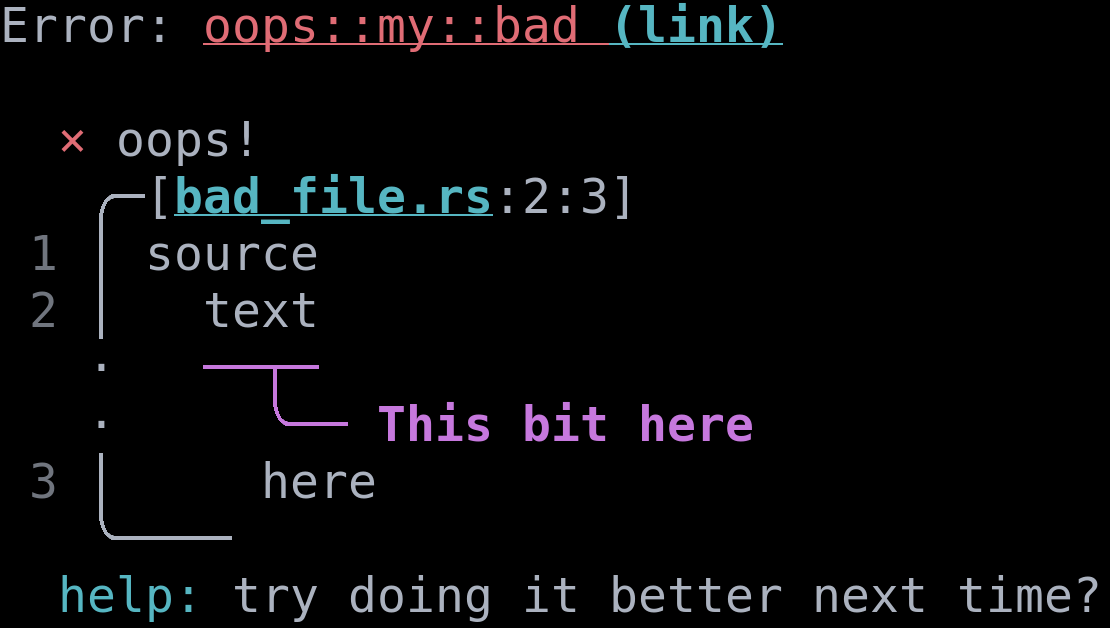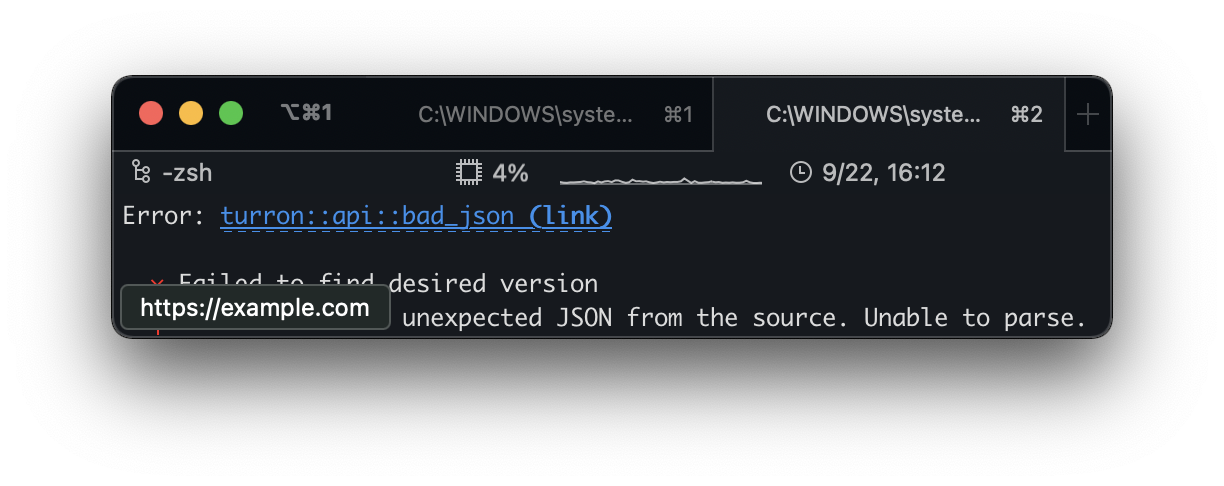miette
You run miette? You run her code like the software? Oh. Oh! Error code for coder! Error code for One Thousand Lines!
About
miette is a diagnostic library for Rust. It includes a series of
traits/protocols that allow you to hook into its error reporting facilities,
and even write your own error reports! It lets you define error types that
can print out like this (or in any format you like!):
NOTE: You must enable the
"fancy"crate feature to get fancy report output like in the screenshots above. You should only do this in your toplevel crate, as the fancy feature pulls in a number of dependencies that libraries and such might not want.
Table of Contents
Features
- Generic
Diagnosticprotocol, compatible (and dependent on)std::error::Error. - Unique error codes on every
Diagnostic. - Custom links to get more details on error codes.
- Super handy derive macro for defining diagnostic metadata.
- Replacements for
anyhow/eyretypesResult,Reportand themiette!macro for theanyhow!/eyre!macros. - Generic support for arbitrary
SourceCodes for snippet data, with default support forStrings included.
The miette crate also comes bundled with a default ReportHandler with
the following features:
- Fancy graphical diagnostic output, using ANSI/Unicode text
- single- and multi-line highlighting support
- Screen reader/braille support, gated on
NO_COLOR, and other heuristics. - Fully customizable graphical theming (or overriding the printers entirely).
- Cause chain printing
- Turns diagnostic codes into links in supported terminals.
Installing
Using cargo-edit:
$ cargo add mietteIf you want to use the fancy printer in all these screenshots:
$ cargo add miette --features fancyExample
/*
You can derive a `Diagnostic` from any `std::error::Error` type.
`thiserror` is a great way to define them, and plays nicely with `miette`!
*/
use miette::{Diagnostic, SourceSpan};
use thiserror::Error;
#[derive(Error, Debug, Diagnostic)]
#[error("oops!")]
#[diagnostic(
code(oops::my::bad),
url(docsrs),
help("try doing it better next time?")
)]
struct MyBad {
// The Source that we're gonna be printing snippets out of.
// This can be a String if you don't have or care about file names.
#[source_code]
src: NamedSource,
// Snippets and highlights can be included in the diagnostic!
#[label("This bit here")]
bad_bit: SourceSpan,
}
/*
Now let's define a function!
Use this `Result` type (or its expanded version) as the return type
throughout your app (but NOT your libraries! Those should always return
concrete types!).
*/
use miette::{NamedSource, Result};
fn this_fails() -> Result<()> {
// You can use plain strings as a `Source`, or anything that implements
// the one-method `Source` trait.
let src = "source\n text\n here".to_string();
let len = src.len();
Err(MyBad {
src: NamedSource::new("bad_file.rs", src),
bad_bit: (9, 4).into(),
})?;
Ok(())
}
/*
Now to get everything printed nicely, just return a `Result<()>`
and you're all set!
Note: You can swap out the default reporter for a custom one using
`miette::set_hook()`
*/
fn pretend_this_is_main() -> Result<()> {
// kaboom~
this_fails()?;
Ok(())
}And this is the output you'll get if you run this program:
Using
... in libraries
miette is fully compatible with library usage. Consumers who don't know
about, or don't want, miette features can safely use its error types as
regular std::error::Error.
We highly recommend using something like thiserror
to define unique error types and error wrappers for your library.
While miette integrates smoothly with thiserror, it is not required.
If you don't want to use the Diagnostic derive macro, you can implement
the trait directly, just like with std::error::Error.
// lib/error.rs
use miette::Diagnostic;
use thiserror::Error;
#[derive(Error, Diagnostic, Debug)]
pub enum MyLibError {
#[error(transparent)]
#[diagnostic(code(my_lib::io_error))]
IoError(#[from] std::io::Error),
#[error("Oops it blew up")]
#[diagnostic(code(my_lib::bad_code))]
BadThingHappened,
}Then, return this error type from all your fallible public APIs. It's a best
practice to wrap any "external" error types in your error enum instead of
using something like Report in a library.
... in application code
Application code tends to work a little differently than libraries. You don't always need or care to define dedicated error wrappers for errors coming from external libraries and tools.
For this situation, miette includes two tools: Report and
IntoDiagnostic. They work in tandem to make it easy to convert regular
std::error::Errors into Diagnostics. Additionally, there's a
Result type alias that you can use to be more terse.
When dealing with non-Diagnostic types, you'll want to
.into_diagnostic() them:
// my_app/lib/my_internal_file.rs
use miette::{IntoDiagnostic, Result};
use semver::Version;
pub fn some_tool() -> Result<Version> {
Ok("1.2.x".parse().into_diagnostic()?)
}miette also includes an anyhow/eyre-style Context/WrapErr traits
that you can import to add ad-hoc context messages to your Diagnostics, as
well, though you'll still need to use .into_diagnostic() to make use of
it:
// my_app/lib/my_internal_file.rs
use miette::{IntoDiagnostic, Result, WrapErr};
use semver::Version;
pub fn some_tool() -> Result<Version> {
Ok("1.2.x"
.parse()
.into_diagnostic()
.wrap_err("Parsing this tool's semver version failed.")?)
}... in main()
main() is just like any other part of your application-internal code. Use
Result as your return value, and it will pretty-print your diagnostics
automatically.
NOTE: You must enable the
"fancy"crate feature to get fancy report output like in the screenshots here.** You should only do this in your toplevel crate, as the fancy feature pulls in a number of dependencies that libraries and such might not want.
use miette::{IntoDiagnostic, Result};
use semver::Version;
fn pretend_this_is_main() -> Result<()> {
let version: Version = "1.2.x".parse().into_diagnostic()?;
println!("{}", version);
Ok(())
}Please note: in order to get fancy diagnostic rendering with all the pretty
colors and arrows, you should install miette with the fancy feature
enabled:
miette = { version = "X.Y.Z", features = ["fancy"] }... diagnostic code URLs
miette supports providing a URL for individual diagnostics. This URL will
be displayed as an actual link in supported terminals, like so:
To use this, you can add a url() sub-param to your #[diagnostic]
attribute:
use miette::Diagnostic;
use thiserror::Error;
#[derive(Error, Diagnostic, Debug)]
#[error("kaboom")]
#[diagnostic(
code(my_app::my_error),
// You can do formatting!
url("https://my_website.com/error_codes#{}", self.code().unwrap())
)]
struct MyErr;Additionally, if you're developing a library and your error type is exported
from your crate's top level, you can use a special url(docsrs) option
instead of manually constructing the URL. This will automatically create a
link to this diagnostic on docs.rs, so folks can just go straight to your
(very high quality and detailed!) documentation on this diagnostic:
use miette::Diagnostic;
use thiserror::Error;
#[derive(Error, Diagnostic, Debug)]
#[diagnostic(
code(my_app::my_error),
// Will link users to https://docs.rs/my_crate/0.0.0/my_crate/struct.MyErr.html
url(docsrs)
)]
#[error("kaboom")]
struct MyErr;... snippets
Along with its general error handling and reporting features, miette also
includes facilities for adding error spans/annotations/labels to your
output. This can be very useful when an error is syntax-related, but you can
even use it to print out sections of your own source code!
To achieve this, miette defines its own lightweight SourceSpan type.
This is a basic byte-offset and length into an associated SourceCode
and, along with the latter, gives miette all the information it needs to
pretty-print some snippets! You can also use your own Into<SourceSpan>
types as label spans.
The easiest way to define errors like this is to use the
derive(Diagnostic) macro:
use miette::{Diagnostic, SourceSpan};
use thiserror::Error;
#[derive(Diagnostic, Debug, Error)]
#[error("oops")]
#[diagnostic(code(my_lib::random_error))]
pub struct MyErrorType {
// The `Source` that miette will use.
#[source_code]
src: String,
// This will underline/mark the specific code inside the larger
// snippet context.
#[label = "This is the highlight"]
err_span: SourceSpan,
// You can add as many labels as you want.
// They'll be rendered sequentially.
#[label("This is bad")]
snip2: (usize, usize), // `(usize, usize)` is `Into<SourceSpan>`!
// Snippets can be optional, by using Option:
#[label("some text")]
snip3: Option<SourceSpan>,
// with or without label text
#[label]
snip4: Option<SourceSpan>,
}... help text
miette provides two facilities for supplying help text for your errors:

![Hi! miette also includes a screen-reader-oriented diagnostic printer that's enabled in various situations, such as when you use NO_COLOR or CLICOLOR settings, or on CI. This behavior is also fully configurable and customizable. For example, this is what this particular diagnostic will look like when the narrated printer is enabled:
\
Error: Received some bad JSON from the source. Unable to parse.
Caused by: missing field `foo` at line 1 column 1700
\
Begin snippet for https://api.nuget.org/v3/registration5-gz-semver2/json.net/index.json starting
at line 1, column 1659
\
snippet line 1: gs":["json"],"title":"","version":"1.0.0"},"packageContent":"https://api.nuget.o
highlight starting at line 1, column 1699: last parsing location
\
diagnostic help: This is a bug. It might be in ruget, or it might be in the
source you're using, but it's definitely a bug and should be reported.
diagnostic error code: ruget::api::bad_json](https://raw.githubusercontent.com/zkat/miette/main/images/serde_json.png)

